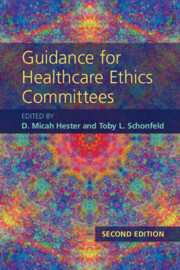Book contents
- Guidance for Healthcare Ethics Committees
- Guidance for Healthcare Ethics Committees
- Copyright page
- Dedication
- Contents
- Contributors
- Preface
- Section 1 The Context of Healthcare Ethics Committee Work
- Section 2 Consultation
- Section 3 Policy Development and Organizational Issues
- Chapter 24 Conscientious Objection
- Chapter 25 Ethics Committees and Distributive Justice
- Chapter 26 Developing and Implementing Effective Ethics Policy
- Chapter 27 Ethics In and For the Organization
- Chapter 28 The Healthcare Ethics Committee as Educator
- Chapter 29 Understanding Ethics Pedagogy
- Chapter 30 Quality Assessment of Healthcare Ethics Committees
- Index
- References
Chapter 24 - Conscientious Objection
from Section 3 - Policy Development and Organizational Issues
Published online by Cambridge University Press: 17 February 2022
- Guidance for Healthcare Ethics Committees
- Guidance for Healthcare Ethics Committees
- Copyright page
- Dedication
- Contents
- Contributors
- Preface
- Section 1 The Context of Healthcare Ethics Committee Work
- Section 2 Consultation
- Section 3 Policy Development and Organizational Issues
- Chapter 24 Conscientious Objection
- Chapter 25 Ethics Committees and Distributive Justice
- Chapter 26 Developing and Implementing Effective Ethics Policy
- Chapter 27 Ethics In and For the Organization
- Chapter 28 The Healthcare Ethics Committee as Educator
- Chapter 29 Understanding Ethics Pedagogy
- Chapter 30 Quality Assessment of Healthcare Ethics Committees
- Index
- References
Summary
Healthcare ethics committee (HEC) members frequently are called upon to provide guidance pertaining to conscientious objection. This guidance can include case consultation, policy creation, and education. For HEC members to effectively perform these functions, they will need to understand when an objection to providing a medical service is a conscientious objection, reasons for accommodating conscientious objectors, the need for ethical constraints on accommodation, and the basics of institutional management of conscientious objection. These issues are addressed in this chapter.
- Type
- Chapter
- Information
- Guidance for Healthcare Ethics Committees , pp. 208 - 218Publisher: Cambridge University PressPrint publication year: 2022



